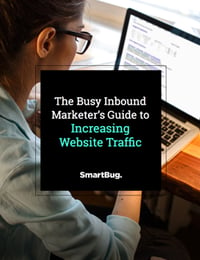
8 Ways to Increase Organic Traffic
January 13, 2015
Are you struggling to bring more visitors to your website? Simply looking to improve your SEO efforts? Organic traffic is known to be one of the best ways to grab profitable visitors. When these visitors search for something online and land on your website, they are most likely to convert into customers or clients. Building organic traffic takes a great deal of time and effort, however can be done effectively with a consistent strategy and proper optimization. With the proper tools and executive, you can turn your website into a full-fueled SEO machine.
Here are a few tips and tricks we recommend to increase organic traffic to your website:
-
Perform Keyword Research: Before getting started, you need to make sure you know your personas and topics you want to rank for. It’s best to start with a list of about 5-10 topics that fit your niche, then use those topics to later come up with specific keywords.
EXAMPLE: If you're a marketing agency, your list may include topics such as “marketing agency”, “SEO”, “email marketing”, “social media”, and “online marketing”. Once you have your list, you should begin thinking of phrases your audience will be searching for. Hubspot provides a Keyword tool that lets you sort through your keyword list based on criteria such as visits, rank, and difficulty, so you can quickly cut through the clutter. Keep your eye toward targeting keywords with high search volume and low competition.
-
Optimize your website: Once you’ve established your list of keywords you plan to target, you’re ready to begin optimizing your website. Be sure to put your content is in a language that search engines and your target audience can understand. Use your list of keywords on your homepage, header tags, meta-description and in the URL of pages throughout your website. Be sure to avoid “keyword-stuffing” while keeping your website organized and easy to navigate.
-
Use long tail keywords: Short, key-phases such as “marketing agency” have become too broad and competitive as the market grows. Instead, you should focus on long-tail key phrases that are tailored to your product or service. For example, you could try something more specific such as “marketing agency in Seattle Washington” or “inbound marketing agency in Los Angeles”. Studies show long-tail key phrases are driving results due to greater relevancy and less competition.
-
Blog often: Use a blog to attract and teach your visitors. A blog is a great opportunity to become a thought leader in your industry. Search engines love frequently updated websites - so make sure you keep on a blogging schedule and post regularly! More importantly, users love it too. A site that’s consistently updated will tell your audience you’re serious about providing good content, which gives them a reason to invest their time on your site and continue coming back.
-
Create Quality Content: Write for your personas, not search engines. As mentioned earlier, search engines love frequently updated content however, pumping out keyword-stuffed articles won’t get you very far. By providing quality educational content that resonates with your audience, you’ll naturally improve your SEO. Your site should provide users with content they are looking for while using keywords they are searching on Google. Use keywords to get your articles found, but remember to always provide quality over quantity.
-
Get social: Social recommendation has quickly become one of the best ways to promote your content and attract visitors to your website. Google understands the importance of social presence and is taking social media as a great signal to rank content. Make sure you are providing social sharing links on your blog posts and are frequently updating your social accounts with new, relevant information to attract visitors.
-
Partake in ethical link building: Once you’ve built up a decent catalog of information on your site, you can begin adding links in your blog posts, guiding visitors to more relevant content. This will help keep visitors on your website for longer, which helps boost your search ranking. Generally stick to 3-5 internal links in your posts - too many and it will begin to look like spam.
-
Play by the rules: You won’t get ahead by trying to take shortcuts. Unfortunately, many SEOs try to use unethical practices, also know as black hat SEO, to try to trick search engines into giving them a higher ranking. Anything promising quick results will most likely result in penalty, or worse, your site will be removed from Google’s index altogether.
Increasing organic traffic is a timely process but by following a few of these simple rules you will be greatly rewarded by search engines. What else would you add to our list? Let us know by tweeting us at @smartbugmedia.

About the author
Lexie Carbone was formerly an Associate Consultant at SmartBug Media. Read more articles by Lexie Carbone.





















